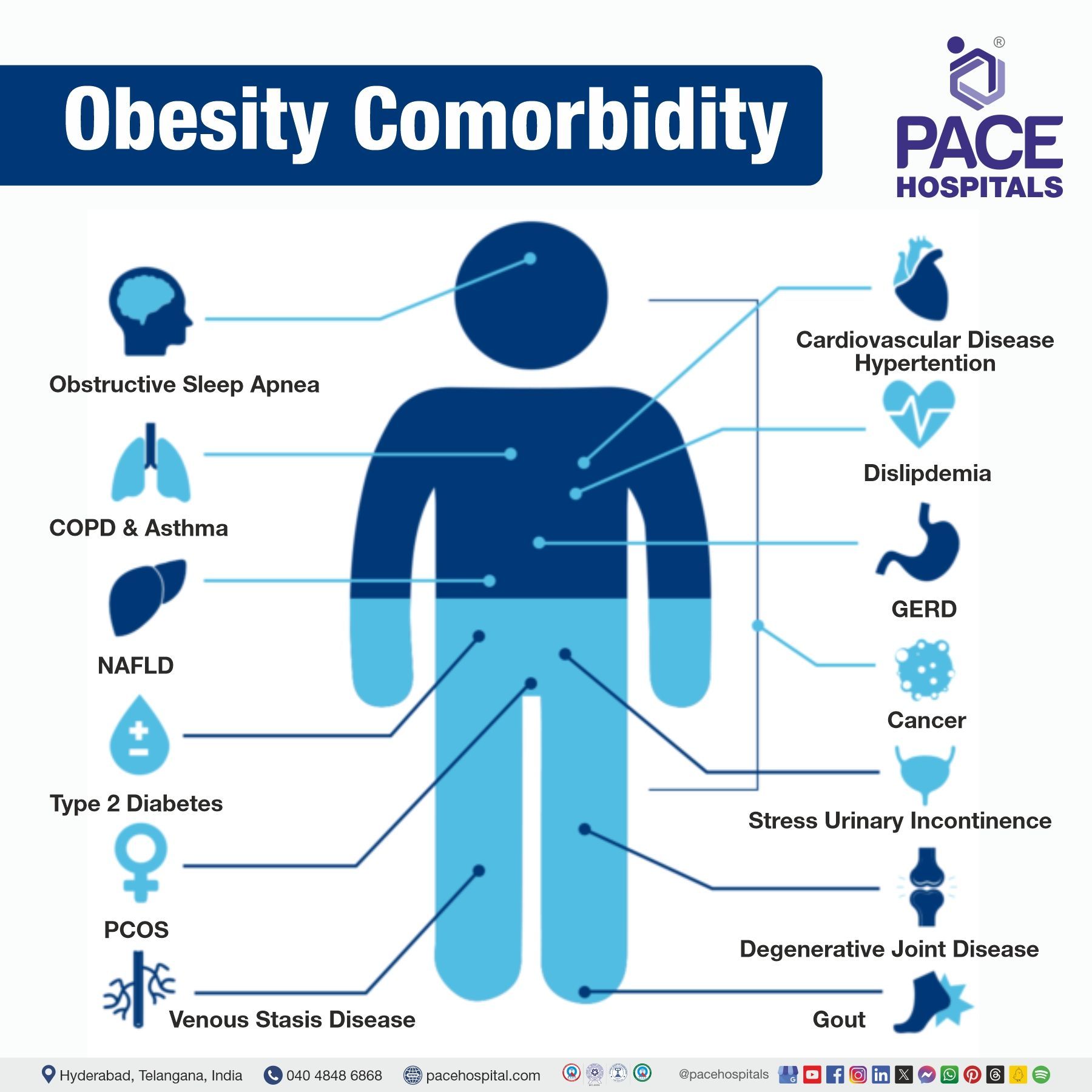Best Weight Loss Hospital in Hyderabad, India - Bariatric Surgery for Severe Obesity Treatment
PACE Hospitals is one of the best Weight Loss (Bariatric) Hospital in Hyderabad, providing comprehensive, personalized and tailored bariatric treatment plans based on patient health conditions. The team of experienced bariatric doctors and bariatric surgeons have extensive expertise in managing morbid obesity, aiming at lesser recovery time, long-term outcome and minimal complications with the help of advanced laparoscopic and endoscopic procedures like:
- Roux-en-Y Gastric Bypass (RYGB)
- Sleeve Gastrectomy
- Adjustable Gastric Banding
- Endoscopic Sleeve Gastroplasty (ESG)
Request an appointment
Bariatric Appointment Enquiry
Thank you for contacting us. We will get back to you as soon as possible. Kindly save these contact details in your contacts to receive calls and messages:-
Appointment Desk: 04048486868
Whatsapp: 8977889778
Regards,
PACE Hospitals
Hitech City and Madinaguda
Hyderabad, Telangana, India.
Oops, there was an error sending your message. Please try again later. Kindly save these contact details in your contacts to receive calls and messages:-
Appointment Desk: 04048486868
Whatsapp: 8977889778
Regards,
PACE Hospitals
Hitech City and Madinaguda
Hyderabad, Telangana, India.
Why choose PACE Hospitals for Bariatric surgery?
Comprehensive Bariatric Treatment
Providing comprehensive bariatric treatment involving invasive and non-invasive modalities to manage severe obesity and its related metabolic disorders.
Advanced State-of-the-art Facility
Equipped with advanced and latest diagnostic equipment, robotic and minimally invasive surgical facilities to treat severe obesity and associated comorbidities.
Skilled & Experienced Bariatric Doctors
Team of experienced bariatric surgeon, bariatric doctors with vast experience in minimally invasive and laparoscopic surgeries to manage morbid obesity.
Advanced Centre for Weight Loss Treatment (Bariatrics) in Hyderabad, Telangana, India

The bariatric department at PACE Hospitals is one of the best weight loss hospital in Hyderabad, staffed with a team of skilled and experienced bariatric physicians, bariatric surgeons, general physicians, endocrinologist and a multidisciplinary team to manage and treat severe obesity and related metabolic disorders. Bariatric surgeons have extensive expertise and are well-versed with the latest laparoscopic and endoscopic treatment modalities, including gastric bypass, sleeve gastrectomy, adjustable gastric banding, and endoscopic sleeve gastroplasty to minimize complications, recovery time and cater long-lasting outcomes.
The Department of Bariatric at PACE Hospitals has state-of-the-art facilities that provide the latest and advanced medical equipment for minimally invasive procedures and precise diagnostic outcomes. These facilities cater to personalized and tailored treatment plans for individuals based on the medical conditions of the patients. The bariatric department aims to provide comprehensive care, including nutritional counselling, psychological support, and personalized exercise plans for faster recovery and long-term outcomes.
3,12,338
98,538
684
2011
Best Bariatric Surgeon in Hyderabad | Top Bariatric Doctors
PACE Hospitals is proud to have a team of the best bariatric doctor and surgeon in Hyderabad, who has transformed the lives of numerous patients through expert weight loss treatment. With 20+ years of experience and a proven track record of successful outcomes, our team is highly regarded for their skill and expertise in performing a range of bariatric procedures, including gastric bypass, sleeve gastrectomy, gastric banding and endoscopic sleeve gastroplasty (ESG).
At PACE Hospitals, we understand that bariatric surgery is a significant decision that requires careful consideration and personalized care. That's why we offer comprehensive consultations and support to help our patients make informed choices about their weight loss journey.
Our team of the best bariatric doctors in Hyderabad is committed to providing the highest level of care and attention to every patient, using the latest endoscopic interventions, surgical techniques and technology to ensure safe and effective procedures with minimal downtime. With a focus on long-term weight loss success, we also offer post-surgery support and guidance to help our patients maintain their new healthy lifestyle and achieve their weight loss goals.
Dr. Govind Verma
MD, DM (Gastroenterology), Fellowship in EUS
24+ years of Exp.
Interventional Gastroenterologist, Transplant Hepatologist, Pancreatologist and Endosonologist
Dr. Suresh Kumar S
MBBS, MS (General Surgery), M.Ch (Surgical Gastroenterology)
13+ years of Exp.
Surgical Gastroenterologist, Bariatric and Metabolic Surgeon, GI and HPB Oncologist, Liver Transplant Surgeon
Bariatric Surgery and FAQs Explained
Need Help?
Are you struggling with severe obesity (BMI more than 35) and its associated complications like cardiovascular disease, diabetes, hypertension, dyslipidemia, and sleep apneas and finding it tough to lose weight despite all effort and seeking effective and long term management of obesity then our department of bariatrics, staffed with skilled bariatric doctors provides you proper support and medical care with a comprehensive treatment plan including initial diagnosis to advanced surgical and non-surgical procedures, tailored to the specific need to achieve a long-lasting result.
-
What is Bariatrics?
Bariatrics is a speciality in medical science that deals with severe obesity and its related conditions. It also manages weight loss through different treatment modalities, including lifestyle modifications, pharmacotherapy, minimally invasive techniques, and surgical interventions. The main goal of bariatrics is to help individuals with severe obesity (BMI more than 30) maintain a healthy weight to rule out the risks and complications of obesity, which includes diseases like type 2 diabetes, hypertension, sleep apnea, and cardiovascular disease.
-
Who is an Ideal candidate for Bariatric Surgery?
Bariatric surgery candidates include those with a BMI of 40 or more, a BMI of 35 or more and, severe obesity-related health issues, and those with a BMI of 30 or more and uncontrolled type 2 diabetes.
-
What types of Bariatric Surgeries are available?
Bariatric surgery is also known as weight loss surgery. There are different types of surgical procedures in bariatric surgeries. They are:
- Roux-en-Y Gastric bypass (RYGB)
- Biliopancreatic diversion/ duodenal switch (BPD-DS)
- Endoscopic sleeve gastroplasty
- Sleeve gastrectomy
- Laparoscopic gastric band
- Single-incision bariatric surgery
- Revisional bariatric surgery
-
What pre-surgery evaluations and tests are required for Bariatric Surgery?
Pre-surgery evaluations involve assessments by endocrinologists, dieticians, psychologists, anesthesiologists, cardiologists, and surgeons. Necessary tests include complete blood count, iron, vitamins, folate levels, coagulation and metabolic panel, and imaging studies.
- Psychological evaluation: Mental health, alcohol dependency, smoking
- Medical clearance: screening cardiac diseases and sleep apnea.
- Anesthetic considerations
- Nutritional evaluation
- Weight loss plan
-
What is the success rate of Bariatric Surgery?
The long-term success rate of bariatric surgery is between 68% and 74%. However, studies have shown decreases in mortality and obesity-related complications, along with improvements in quality of life and mental health.
-
What is the difference between Gastric Bypass, Sleeve Gastrectomy, and Adjustable Gastric Banding?
Sleeve Gastrectomy, Gastric Bypass (Roux-en-Y) and Adjustable Gastric Banding are all common bariatric surgeries. The goal and mechanism of each procedure vary. Each procedure has its own benefits and considerations, and the selection of procedures depends on the individual's weight loss goal and condition.
In the Gastric Bypass (Roux-en-Y) surgery, a small pouch is made in the stomach, and a portion of the small intestine is rerouted to this pouch to reduce the stomach size and limit calorie and nutrient absorption. This procedure is complex and can lead to risks and nutritional deficiency. In contrast, in sleeve gastrectomy, a tube-like sleeve is created by removing approximately 80% of the stomach, intending to limit food intake and craving by controlling the hunger hormone ghrelin. This procedure is less complicated than Gastric Bypass. In Adjustable Gastric Banding, an adjustable silicone band is placed in the upper part of the stomach to create a small pouch to control the food intake. This procedure is less invasive and complicated but requires frequent follow-up for band adjustment.
-
Are there non-surgical weight loss options if I am not a candidate for surgery?
Yes, there are non-surgical weight loss options, including procedures like a gastric balloon, aspire to assist, and the ROSE procedure. Other options are medication therapy, diet, and lifestyle changes.
-
Can Bariatric Surgery help with diabetes and other obesity-related conditions?
Yes, various studies have reported an improvement after bariatric surgery in diabetes and other obesity-related conditions like sleep apnea and heart diseases. The effect of surgery will also vary depending on the type of surgery.
-
Can Bariatric Surgery impact fertility and menstrual cycles?
Bariatric surgery helps in improving ovulatory status and reducing androgenic (male) hormones which helps improve fertility. It is known to decrease follicular phase of menstrual cycle which can lead to improved ovulation.
-
Is Bariatric Surgery safe for teenagers?
Yes, research indicates bariatric surgery is safe for teenagers, similar to adults. Teenagers require careful attention to nutrition due to their ongoing growth and development.
-
What are the criteria for adolescent Bariatric Surgery?
Criteria for adolescent bariatric include:
- Failed at healthy weight reduction using a structured program for a 6-month period
- Reached tanner scale stage (a scale to access physical development of children
- Skeletal maturity of >95%
- Understanding of lifestyle changes and dietary requirement
- Good psychological well-being with strong social support
-
What is the role of endoscopic procedures in Bariatrics?
Endoscopy is crucial before and after bariatric surgery. Pre-surgery, it detects hidden anatomical issues, helping with surgery selection. Post-surgery, it identifies anatomical changes like the size of the stomach and intestine.
-
What is the success rate of Bariatric Surgery?
The long-term success rate of bariatric surgery is between 68% and 74%. However, studies have shown decreases in mortality and obesity-related complications, along with improvements in quality of life and mental health.
What we treat?
We specialize in treating and managing severe obesity and associated complications through various bariatric management approaches depending on the goal of weight loss and patient health conditions, including different bariatric surgeries, non-invasive weight management and nutritional counselling, and behavioural and psychological support. Our team of experienced bariatric surgeons and bariatric physicians have vast expertise in handling morbid obesity with a BMI of 30 or higher to help patients maintain a healthy weight and rule out the other comorbidities related to obesity like Type 2 Diabetes, Hypertension, Cardiovascular disease, Sleep apnoea and more.

List of Obesity Comorbidities Indicating Bariatric Treatment
-
Cardiovascular Disease
Reducing obesity-related risk factors can decrease the incidence of heart disease. Obese patients experience elevated cardiac output to meet the metabolic demand caused by excess fatty tissue. Bariatric surgery patients are 49% less likely to develop major cardiovascular events, such as heart attacks and heart failure.
-
Stroke
Lowering obesity can reduce the risk of stroke. Obesity contributes to the advancement of atherosclerosis and the development of thromboembolism, potentially resulting in arterial blockage. Bariatric surgery patients have a 71% decrease in risk of developing stroke.
-
NAFLD and NASH
Weight loss can improve liver function and has been proven to reduce liver fat. Various studies have shown reduced liver fat on a 3-5% decrease in whole body weight.
-
Polycystic Ovary Syndrome (PCOS)
Weight loss can improve symptoms and increase fertility. Weight loss in overweight women with PCOS has been known to improve insulin sensitivity, metabolic health, reproductive function, and hyperandrogenic features. Based on several studies, the incidence of PCOS has decreased from 45.6% to 6.8% in a year due to bariatric surgery.
-
Metabolic Syndrome
Bariatric surgery can improve or resolve conditions associated with metabolic syndrome, such as insulin resistance, dyslipidemia, and hypertension.
-
Type 2 Diabetes
Obese patients are often associated with diabetes. The outcomes of clinical trials show that bariatric surgery improves diabetes in 33–90% of patients one year after treatment, compared to 0–39% of those who received medical management. Although the improvement rates decrease over time, they are still higher in patients who underwent surgical treatment.
-
Dyslipidemia
Bariatric surgery significantly improves the lipid-lipoprotein profile and metabolism through various mechanisms. Potential causes for the remission of dyslipidemia following bariatric surgery may include alterations in adipose tissue distribution and function, enhanced insulin sensitivity, and a beneficial impact on liver fat levels.
-
Hypertension
Bariatric surgery is a very successful therapy for hypertension associated with obesity, leading to the remission of hypertension in over 50% of patients. However, a higher requirement for antihypertensive medication before bariatric surgery and a smaller amount of weight loss during the follow-up period are both potential obstacles to achieving complete remission of hypertension. The Hypertension remission rate is 43-83% within one year of surgery.
-
Obstructive Sleep Apnea
Bariatric surgery leads to a notable decrease in the apnea-hypopnea index. Nevertheless, the average apnea-hypopnea index following weight loss surgery indicated the presence of moderately severe OSA. These individuals will probably require ongoing OSA treatment to reduce its potential complications.
-
Osteoarthritis
Bariatric surgery has effectively improved joint pain in the early postoperative period. However, the degree of improvement in osteoarthritis after surgery is not as remarkable as that in other obesity-related comorbidities. When bariatric surgery is combined with changes in diet and exercise, significant results are seen in weight loss, knee pain, and function.
-
Chronic Kidney Disease
Weight loss can improve kidney function, as obesity is one of the risk factors for kidney disease. Chronic kidney disease (CKD) linked to obesity is believed to be caused by the buildup of fat within the kidneys and changes in kidney function involving increased filtration, reduced glomerular filtration rate, and the presence of albumin in the urine. It is reported that bariatric surgery has decreased the development of CKD by 54%.
-
Venous Stasis Disease
Weight loss can improve venous circulation and reduce symptoms. It is reported that 95% of gastric bypass patients have significantly reported complete recovery of venous stasis disease.
-
Reproductive Complications
In women, obesity can cause infertility, which can be improved with weight loss. Obesity can induce insulin resistance and alter sex hormones, which is linked to the failure of a woman to produce an egg from each ovary each month.
-
Urinary Incontinence
Most women experienced an improvement in stress urinary incontinence symptoms and a reduction in its impact on quality of life after losing weight through bariatric surgery. After undergoing bariatric surgery, nearly half of women and over one-fifth of men with severe obesity reported prevalent incontinence in the past three months. Three years post-surgery, significant enhancements in incontinence were observed, leading to remission for most women and men.
-
Cancer
The development of cancer due to obesity is strongly linked to metabolic syndrome, high levels of insulin, and dysfunctional visceral fat. Bariatric surgery in severely obese patients significantly improves the symptoms of metabolic syndrome and hormonal imbalances and considerably decreases the risk of overall cancer-related deaths and cancer occurrence.
Patient Testimonials
52-year-old female with uncontrolled sugar associated with chronic obstructive pulmonary disease (COPD) and hernia, underwent an efficient and safe weight loss surgery from 130 kg to 84 kg.
50-year-old male with 153 kg (BMI 54) weight, uncontrolled diabetes mellitus, hypertension, chronic obstructive pulmonary disease (COPD), obstructive Sleep Apnea (OSA). Post surgery, lost 40 kg of weight.
Diagnostic Tests and Procedures Performed
We provide comprehensive diagnostic tests and treatment plans. Our team of skilled and experienced bariatric doctors conduct thorough evaluations to understand and analyse health conditions and other comorbidities to offer personalized, precise, and effective weight loss management plans. Comprehensive diagnosis comprises advanced imaging tests, metabolic assessment, and nutritional analysis to decide on sustainable weight loss treatment plans, including minimally invasive procedures like adjustable gastric banding, sleeve gastrectomy and noninvasive procedures like endoscopic sleeve gastroplasty and intragastric balloon placement.

Diagnosis for Bariatric Management:
Below are the necessary diagnostics for bariatric management. These helps determine the patient's overall health status, identify any comorbidities, and ensure they are a suitable candidate for bariatric surgery or other weight management interventions.
- Comprehensive medical history and physical examination.
- Review of previous weight loss attempts, diet history, and exercise habits.
- Assessment of comorbid conditions such as diabetes, hypertension, sleep apnoea, and cardiovascular disease.
- Laboratory Tests
- Complete blood count (CBC)
- Lipid panel: To assess cholesterol levels.
- Liver function tests: To check for fatty liver disease or other liver conditions.
- Thyroid function tests: To rule out hypothyroidism.
- Pulmonary function tests: To evaluate sleep apnoea or other respiratory conditions common in obese individuals.
- Fasting blood glucose and HbA1c: To assess for diabetes or pre-diabetes.
- Electrolytes, kidney function (BUN and creatinine)
- Vitamins and minerals: Vitamin D, B12, iron, calcium, and others.
- Imaging Studies
- Abdominal ultrasound: To assess the liver and the gallbladder health.
- Chest X-ray/ CT scan: To check for respiratory issues.
- Electrocardiogram (ECG): To determine heart health and function.
- Nutritional and Psychological Assessment
- Evaluation by a dietitian to understand eating habits and nutritional intake.
- To identify any psychological issues, eating disorders, or willingness for lifestyle changes.
- Endoscopy: In some cases, to check for gastrointestinal problems such as GERD or ulcers.
Bariatric Procedures Performed:
1. Roux-en-Y Gastric bypass (RYGB): The stomach size is reduced, and the small intestine is rearranged to restrict the number of calories absorbed. This procedure can also address complications associated with obesity. It is usually carried out through laparoscopic surgery and lasts between 1.5 to 4 hours.
2. Biliopancreatic Diversion: This procedure is also known as malabsorptive surgery, which involves removing a portion of the stomach and connecting it to the end part of the small intestine. This design allows food to pass through only 25% of the small intestine, restricting the absorption of calories and nutrients.
3. Sleeve Gastrectomy: A surgical weight loss procedure involves 75-80% stomach removal. The remaining part of the stomach resembles a banana in size and shape. The amount of food intake is restricted, and you experience a sensation of fullness after consuming small quantities.
4. Laparoscopic Gastric Band: It is also called an adjustable gastric band. It is a surgical procedure involving placing a band around the stomach (upper part) to create a small pouch for food storage. This band restricts food intake by inducing a feeling of fullness even after consuming small quantities. The physician can adjust the band after the surgery to regulate the rate at which food moves through the stomach.
5. Endoscopic Sleeve Gastroplasty: It is also called the accordion procedure. It is a minimally invasive weight-loss procedure that does not require incision. Instead, the endoscopist inserts a suturing device using an endoscope into the throat and down to the stomach and sutures it to reduce the length of the stomach. The goal of the procedure is to limit food intake.
6. Single-Incision Bariatric Surgery: Single-incision laparoscopic surgery (SILS) was used for a variety of bariatric surgeries. Over time, surgeons shifted to placing the incision near the umbilicus for better cosmetic outcomes. This approach effectively hides surgical scars and improves recovery time and comfort for bariatric patients.
Why to choose PACE Hospitals?
- A Multi-Super Speciality Hospital.
- NABH, NABL, NBE & NABH - Nursing Excellence accreditation.
- State-of-the-art Liver and Kidney transplant centre.
- Empanelled with all TPA’s for smooth cashless benefits.
- Centralized HIMS (Hospital Information System).
- Computerized health records available via website.
- Minimum waiting time for Inpatient and Outpatient.
- Round-the-clock guidance from highly qualified neurologists and neurosurgeons.
- Standardization of ethical medical care.
- 24X7 Outpatient & Inpatient Pharmacy Services.
- State-of-the-art operation theaters.
- Intensive Care Units (Surgical and Medical) with ISO-9001 accreditation.
Our Locations – Find the Best Hospital Near You
Metro Pillar Number C1772, Beside Avasa Hotel, Hitech City Road, Near HITEC City Metro Station, Hyderabad, Telangana, India.
Mythri Nagar, Beside South India Shopping Mall, Hafeezpet, Madeenaguda, Hyderabad, Telangana, India.
040 4848 6868
Payment in advance for treatment at PACE Hospitals, Hyderabad, Telangana, India (Pay in INR ₹)
For Bank Transfer:-
- Bank Name: HDFC
Company Name: Pace Hospitals
A/c No.50200028705218
IFSC Code: HDFC0000545 - Bank Name: STATE BANK OF INDIA
Company Name: Pace Hospitals
A/c No.62206858997
IFSC Code: SBIN0020299
Scan QR Code by Any Payment App (GPay, Paytm, Phonepe, BHIM, Bank Apps, Amazon, Airtel, Truecaller, Idea, Whatsapp etc).

CONTACT US
Call: +914048486868
WhatsApp: +918977889778
Email: info@pacehospitals.in
FOLLOW US
SUBSCRIBE
Subscribe to our newsletter and stay updated with the latest health information.
Subscribe to PACE Hospitals' Public Newsletter
Thank you for subscribing to PACE Hospitals' Newsletter. Stay updated with the latest health information.
Oops, there was an error. Please try again submitting your details.
ABOUT US
QUICK LINKS
Disclaimer
General information on healthcare issues is made available by PACE Hospitals through this website (www.pacehospital.com), as well as its other websites and branded social media pages. The text, videos, illustrations, photographs, quoted information, and other materials found on these websites (here by collectively referred to as "Content") are offered for informational purposes only and is neither exhaustive nor complete. Prior to forming a decision in regard to your health, consult your doctor or any another healthcare professional. PACE Hospitals does not have an obligation to update or modify the "Content" or to explain or resolve any inconsistencies therein.
The "Content" from the website of PACE Hospitals or from its branded social media pages might include any adult explicit "Content" which is deemed exclusively medical or health-related and not otherwise. Publishing material or making references to specific sources, such as to any particular therapies, goods, drugs, practises, doctors, nurses, other healthcare professionals, diagnoses or procedures is done purely for informational purposes and does not reflect any endorsement by PACE Hospitals – your trusted hospital near me.





